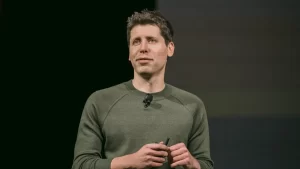
Is Saying “Please” to ChatGPT Costing Millions? Sam Altman Breaks It Down
OpenAI CEO Sam Altman has revealed a surprising truth: your polite prompts—like “please” and “thank you”—aren’t just good manners; they’re costing the company tens of millions of dollars in electricity.
In a recent post on X (formerly Twitter), Altman responded to a user’s question about the energy impact of courteous language used with ChatGPT. His reply, “tens of millions of dollars well spent,” was both humorous and insightful—highlighting the significant operational costs tied to every word processed by the AI.

Why People Use Polite Language with AI
Though ChatGPT lacks consciousness or feelings, many users still interact with it as though it were human. A 2024 survey found that 67% of Americans use polite language when speaking to AI. Of those, 55% said it feels morally right, while 12% admitted they’re hedging their bets in case AI gains power in the future.
This behavior underscores a growing trend: people are treating AI tools less like machines and more like digital companions. Some users even go as far as addressing ChatGPT with playful honorifics like “my lord,” emphasizing a deeper emotional or humorous connection with the technology.
Energy and Cost Implications of Politeness in AI Prompts
While saying “please” might seem harmless, every extra word requires more processing. That increased demand puts additional strain on high-performance data centers that power AI systems like ChatGPT. These centers consume significant electricity and need extensive cooling systems to handle the heat they generate.
For premium ChatGPT users, politeness can have financial implications, too. Paid plans often charge based on token usage—essentially, how much you type. So adding extra words, even courteous ones, can slightly increase your costs.
Experts Say There Are Benefits to Being Polite
Despite the added energy and cost, some professionals advocate for respectful AI interaction. Kurtis Beavers, a design lead at Microsoft, says that polite language tends to generate more thoughtful and collaborative responses from AI systems. Microsoft WorkLab supports this view, noting that AI often mirrors the tone and professionalism of the user’s input.
The Bottom Line
Being polite to ChatGPT may not be free, but for many, it’s worth the cost—whether for ethical reasons, better interactions, or a bit of fun. As AI becomes increasingly embedded in our lives, how we communicate with it continues to evolve, blending social norms with technological efficiency.







